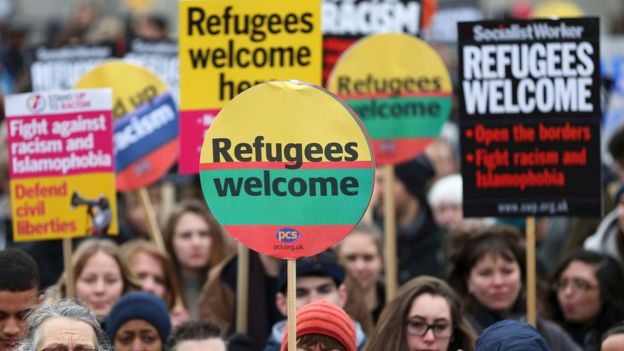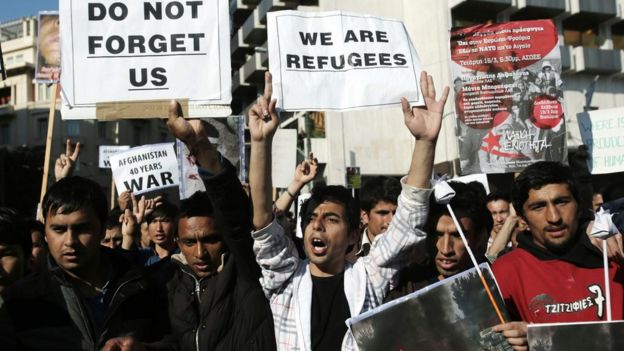The agreement between the EU and Turkey to tackle the migrant crisis has formally come into effect.
Under the deal, migrants arriving in Greece are now expected to be sent back to Turkey if they do not apply for asylum or their claim is rejected.
The influx of people crossing to Greek islands grew ahead of the deadline, and Greece said immediate implementation of the deal would not be possible.Meanwhile, thousands rallied against the deal in several European cities.
The deal says that for every Syrian migrant sent back to Turkey, one Syrian already in Turkey will be resettled in the EU.
However, there were still many doubts about the implementation of the agreement, including how the migrants would be sent back.
Some 2,300 experts, including security and migration officials and translators, are set to arrive in Greece to help enforce the deal.
But Greek officials said none of the experts had yet arrived and the deal could not be implemented immediately as key details still needed to be worked out.
"A plan like this cannot be put in place in only 24 hours," said government migration spokesman Giorgos Kyritsis, quoted by AFP.
◾Unanswered questions
◾What does EU deal involve?
◾Turkey has EU over a barrel
◾Key migrant crisis questions answered
With the deal, it is hoped people will be discouraged from making the dangerous journey by sea from Turkey to Greece. In return, Turkey will receive aid and political concessions.Officials said some 1,500 people crossed the Aegean to Greek islands on Friday, more than double the number the day before and compared with just several hundred a day earlier this week, AFP said.
And, just hours before the truce came into force, a four-month-old baby girl drowned when a boat carrying migrants sank off the Turkish coast, Turkey's Anadolu agency reported.
Since January 2015, one million migrants and refugees have entered the EU by boat from Turkey to Greece. More than 143,000 have arrived this year alone, and about 460 have died, according to the International Organization for Migration.
Key points from the agreement
Returns: All "irregular migrants" crossing from Turkey into Greece from 20 March will be sent back. Each arrival will be individually assessed by the Greek authorities.
◾ One-for-one: For each migrant returned to Turkey, a Syrian migrant will be resettled in the EU. Priority will be given to those who have not tried to illegally enter the EU and the number is capped at 72,000.
◾ Visa restrictions: Turkish nationals should have access to the Schengen passport-free zone by June. This will not apply to non-Schengen countries like Britain.
◾ Financial aid: The EU is to speed up the allocation of €3bn ($3.3 bn; £2.3 bn) in aid to Turkey to help migrants.
◾ Turkey EU membership: Both sides agreed to "re-energise" Turkey's bid to join the European bloc, with talks due by July.
The Turkey-EU statement in full
Most of them are keen to go to Germany and other northern European Union countries, and tens of thousands are now stuck in Greece as their route north has been blocked.Critics, however, have said the deal could force migrants determined to reach Europe to start using other and potentially more dangerous routes, such as the journey between North Africa and Italy.
On Saturday, the Italian coastguard said more than 900 people were rescued amid an increase in traffic through the Strait of Sicily.
Meantime, Libyan authorities said the bodies of four women were recovered but at least 20 others were still missing after a boat carrying migrants sank off the country's coast.
Officials there said they rescued nearly 600 people from three other boats on Saturday.
'Open the borders'
Human rights groups have strongly criticised the deal, with Amnesty International accusing the EU of turning "its back on a global refugee crisis".On Saturday, thousands of people protested in support of refugees and against racism. Rallies were held in London, Athens, Barcelona, Amsterdam, Geneva and some other cities.
In the Greek capital, protesters, including some Afghan refugees, chanted "Open the borders" and "We are human beings, we have rights".
In London, about 4,000 people joined a protest carrying placards with slogans like "Refugees welcome here" and "Stand up to racism".
SOURCE BY: BBC




0 comments:
Post a Comment